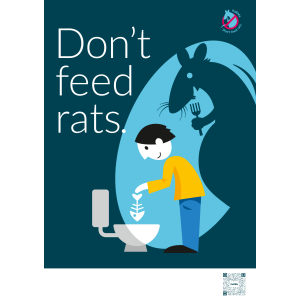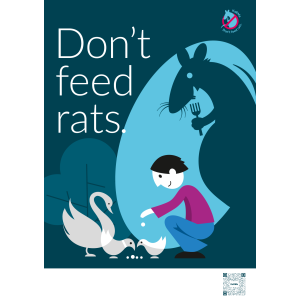Rats are among the most inglorious wildlife inhabitants in our cities. They are considered as health pests because they can transfer diseases to humans and animals, contaminate food with their feces and urine, and damage infrastructure by gnawing and burrowing. Least but not last, rats are often perceived as filthy and disgusting animals, causing emotional distress to many people.
Nonetheless, in most cases it is our own misbehaviour which enable rats to thrive in our vicinity and find enough to eat: Fast food leftovers on the sidewalk, scattered birdseed in the park, overflowing trash cans, and food leftovers being flushed down the toilet into the sewer are the most typical sources of food for rats and therefore of rat infestations in the city.
In order to raise public awareness for the problem behind the problem “city rats”, the German environment agency freely offers various posters and post cards which were designed by the agency „HOCHZWEI“ for this purpose. Four different motifs display typical misbehaviour prompting the occurrence of rats in the city. Citizens are thus made aware of the causes of rat infestation and encouraged to change their behavior.
The advantages for the city, its citizens and the environment are obvious. Less rats in the city means a benefit for:
- the protection of human and animal health due to a reduced risk of infection,
- the security of food and infrastructure,
- the protection of the environment due to reduced use of rat poison which is associated with high risks of wildlife poisoning and also for the environment,
- animal welfare, since rats do not have to be poisoned with chemicals that cause pain and suffering of vertebrates for several days and
- the municipalities since they need to spend less money for rat management.
The four different motifs are available a free download in three different formats (DIN A0, A4, A6). An additional motif draws attention to the correct disposal of waste in various languages and might be posted by property managers on bulletin boards in the hallway. All available documents are free of charge and can be freely used by the municipalities for their own local campaigns. A usage agreement is not necessary.
The campaign was already successfully rolled out in the German cities Kiel and Schleswig in the past. After the acquisition of the legal right of use for the campaign motifs by the German environment agency, the posters are now made cost-free available to all municipalities.
Make free use of the motifs and make your citizens aware of this issue - you will make an important contribution to health and environmental protection in your municipality!
 Click to enlarge
Click to enlarge









